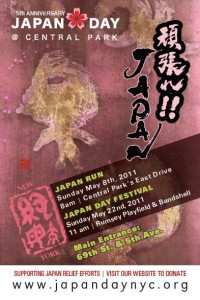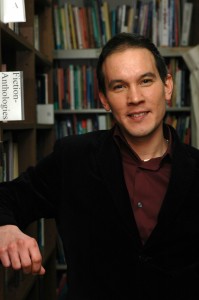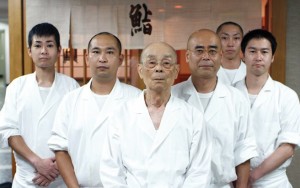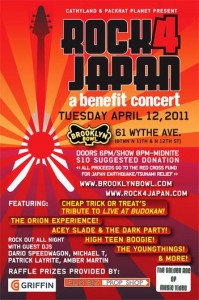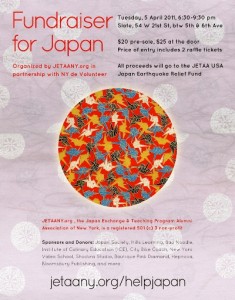Justin’s Japan: Q&A with Grammy Award-Winning Musician Hiromi on ‘Voice’
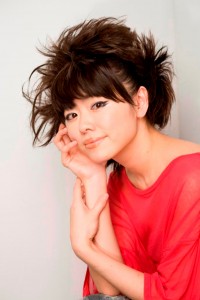
"I went back to Japan right after the earthquake and did a lot of live radio and TV shows to perform live to cheer people up. I just wanted to do something for the country I love and only thing I could do was keep playing music, so I kept playing." (Sakiko Nomura)
By JQ magazine editor Justin Tedaldi (CIR Kobe-shi, 2001-02) for Examiner.com. Visit his page here for related stories.
A native of Hamamatsu, Shizuoka, pianist and composer Hiromi Uehara is one of the world’s top young international performers in jazz, winning a Grammy earlier this year for her work on Stanley Clarke’s most recent album. Today (June 7), she releases Voice, her seventh studio effort since 2003 and first as part of the Trio Project with bassist Anthony Jackson (Paul Simon, the O’Jays, Steely Dan, Chick Corea) and drummer Simon Phillips (the Who, Judas Priest, David Gilmour, Jack Bruce).
“When I play music, I realize that it really filters emotions,” says Hiromi. “I called this album Voice because I believe that people’s real voices are expressed in their emotions.” Tonight, the Berklee College of Music alum launches a six-night residency at New York City’s venerable Blue Note Jazz Club as part of its inaugural Blue Note Jazz Festival. I caught up with the artist in this exclusive interview.
What kinds of goals in mind do you have when you record a new album? How about for a concert?
Making an album is like I have stories to tell; I want to see the landscape in music that I have never seen before. For a concert, I always think today is my first and last, trying to put everything I have out.
A big part of your style is your quicksilver runs across the keys. How did you develop this as your trademark, and are there ever times in concert when you feel like it’s a challenge to keep up that manic pace?
I never really thought about it as my trademark, I just play what I hear, what I have to say at that very moment, just like a conversation.
The toughest part of your job onstage that the audience might not realize is…
Definitely traveling.
I’ve noticed that you’ve been speaking a lot more English for interviews and at your concerts. Are you continuing to study it, and what kind of methods or techniques do you use that you can recommend to others who are learning a second language?
I do watch a lot of movies in English. Don’t be afraid to make mistakes, speak speak speak!
In what ways has the Japanese music community banded together in the wake of the earthquake and tsunami devastation? What has your impression been of the United States and its entertainers’ relief efforts?
I went back to Japan right after the earthquake and did a lot of live radio and TV shows to perform live to cheer people up. I also went back in April to do eighteen benefit shows in Tokyo. I just wanted to do something for the country I love and only thing I could do was keep playing music, so I kept playing. I really would like to thank everyone from the U.S. for their efforts. We surely need continuous support and I will keep doing whatever I can do.
For the rest of the interview, click here.

"I think it’s a gift to experience living in another culture, and if everyone in the world could have the chance to live in another country for a time, the world would probably be a better place." (Photo courtesy of the author)
By JQ magazine editor Justin Tedaldi (CIR Kobe-shi, 2001-02) for Examiner.com. Visit his page here for related stories.
A “certified mad Japanophile,” San Francisco-born and bred writer Wendy Nelson Tokunaga has lived her whole life in the Bay Area, save for a stint in Tokyo in the 1980s after winning a songwriting contest sponsored by Japan Victor Records. Since then, she has penned two Japan-related novels, Midori by Moonlight and Love in Translation.
Her new book, Marriage in Translation: Foreign Wife, Japanese Husband, is a series of illuminating interviews conducted by the author with Western women who talk candidly about the challenges in making cross-cultural marriages work both inside and outside Japan, and the joys and frustrations of adapting to a different culture. Tokunaga explores the theme of why some people feel the need to trade in their native culture for a new one, revealing new insights about Japan and married life. I caught up with the author in this exclusive interview.
What made you decide to write about this topic?
I’ve dated Japanese men and am now married to a Japanese born and raised in Osaka. I’ve always noticed how there are many more Western man/Japanese woman couples than the opposite. Even today, with the Internet and social media and the world shrinking, this pairing is still relatively rare and I think the reasons why are intriguing and fascinating.
The book originally started out as blog entries. When did you get the feeling that it deserved to be a book?
These series of interviews elicited a lot of interest from my blog readers and I got contacted by a couple of small publishers asking if I wanted to make it into a book.
Why did you choose to publish it as an eBook?
I’ve had experience with a traditional publisher, St. Martin’s Press, for my two novels, Midori by Moonlight and Love in Translation. I know how long it takes to get a traditional book published and I wanted to get this book out into the world while the interest was still high. I also wanted to dip my toe into the burgeoning world of eBook publishing and thought this would be a great opportunity.
The list price of $2.99 is certainly attractive. What’s your impression of the sales so far?
I think my sales have been pretty good thus far, especially when you take into consideration that I basically have only marketed this book via Twitter and by doing a bit of other online publicity. It’s a niche book for sure and I’ve also been donating 50% of the sales to Japan Relief. I certainly am not in it for the money!
You said that your husband Manabu felt he never “fit in” in Japan. Would you say this is a common trait among Japanese men who settle down outside of their home countries or cultures? Do you think this might hold less true for Americans who move to Japan?
This is another big question! I don’t have statistics to prove this, but through my own anecdotal evidence and observations over the years I have found that not many Japanese end up moving abroad permanently. There are many reasons for this. First, they don’t have the economic issues that many other immigrants face, and of course there is the tendency to feel that Japanese society is “unique” and can’t be duplicated anywhere else, so why leave?
So I would assume that for a Japanese man to move away from Japan there has to be some pretty compelling reason, especially since they also don’t tend to marry foreign women (though in Japan there are more Japanese men married to non-Japanese than Japanese women married to non-Japanese men. However, these women are usually of Asian ethnicity).
As you probably well know, an American man’s experience in Japan is often quite different. He can be seen as exotic and desirable (at least in the honeymoon stage of his stay) and even though he might undergo a lot of culture shock, things can be quite comfortable for him. Of course I have no choice but to generalize, but I have to say that the differences in experiences between an American man moving to Japan and a Japanese man moving to America couldn’t be more striking. There is nothing special about a Japanese man here in the States, but a gaijin in Japan still causes excitement to this day. On the other hand, to briefly open another topic, we certainly know of the quite different reasons why Japanese women would want to leave Japan. I explore that theme in Midori by Moonlight.
At least one of the interviewees served as a participant of Japan’s global exchange initiative, the JET Program. Tell us about the personal value of living in another country as a young adult compared with being a bit older and moving there with the intention to raise a family.
Well, for one thing a person coming to Japan on the JET Program is usually only going to be in Japan on a temporary basis and, from what I understand, the program purposely hires people who know little about Japan. So they come with no expectations and quite often leave with a wonderful experience. The Western woman coming to Japan to raise a family with her Japanese husband is in a much different situation. And I think the experience will have its differences whether she has been interested in Japanese culture all along or only came into contact with it by meeting her husband abroad. Either way, I think it’s a gift to experience living in another culture and if everyone in the world could have the chance to live in another country for a time, the world would probably be a better place.
Justin’s Japan: Loudness, Akiko Yano Perform Rare Concerts in New York
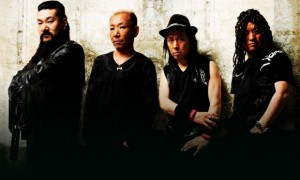
Legendary Japanese metal band Loudness return to Times Square's B.B. King Blues Club & Grill June 1.
By JQ magazine’s Justin Tedaldi (CIR Kobe-shi, 2001-02) for Examiner.com. Visit his page here to subscribe for free alerts on newly published stories.
After their successful tour of Europe last year capped with a headlining gig at Germany’s prestigious Bang Your Head!!! festival, Japan’s Loudness are invading North America for the first time since their sold out 2006 tour, and only the second time since 1991!
Formed in 1981 in Osaka, vocalist Minoru Niihara, guitarist Akira Takasaki (A.K.A. the Eddie Van Halen of Japan), bassist Masayoshi Yamashita and drummer Munetaka Higuchi joined forces to become not only Japan’s premier metal band, but a world class act in their own right, releasing five English-language albums in America in their heyday.
On June 1, the group storms Times Square’s B.B. King Blues Club and Grill, where they last played five years ago in a historic gig filmed for their Loudness in America 06 DVD. (The disc doubles as an epitaph for Higuchi, who succumbed to liver cancer two years later. He was replaced in 2009 by Masayuki Suzuki.)
Metal not your cup of cha? On June 3, Japan Society presents Akiko Yano Solo: Revealing Her Magic. This one-night-only appearance is billed as a concert and talk, exploring renowned singer-songwriter Akiko Yano‘s original music, as influenced and inspired by the unique rhythm and intonation of the Japanese language. In this performance, Yano demonstrates how she bends prose, phrases and salutations into her own musical expressions.
Justin’s Japan: Interview with Inuyama City Councilman/JET Alum Anthony Bianchi
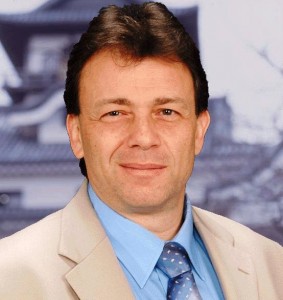
- “The JET Program has great benefits for the country. One of the greatest, but overlooked is the former participants themselves. They all have a great knowledge, understanding and affection for Japan. All have gone on to various careers and are a great but underutilized network.”
By JQ magazine editor Justin Tedaldi (CIR Kobe-shi, 2001-02) for Examiner.com. Visit his page here to subscribe for free alerts on newly published stories.
Anthony Bianchi’s life in Japan took root in the 1980s when the Bensonhurst, Brooklyn native landed a job with the Inuyama City board of education in Aichi Prefecture on the JET Program exchange initiative. He continued to work in Inuyama after JET, and in 2003 gained citizenship, becoming the first-ever North American to hold an elected position in Japan.
In 2006, Bianchi ran for mayor of Inuyama, receiving enough votes to finish third out of eight candidates. He was re-elected to city council in 2007 and started his third term in April. Following a benefit concert for Japan at his alma mater Xaverian High School on March 31, I caught up with the politico in this exclusive interview.
What’s changed for you since you last spoke with JETAA NY in 2008?
I was just reelected for a third term. There are now only four council members with more years on the council than I. That changes the dynamics a bit. How much so we will find out over the next few years. Other than that, local front burner issues have changed, but the job stays pretty much the same. That being said, of course the earthquake and tsunami have changed the country. As a council member in a municipality that was not directly affected, we have to keep in mind what we can do to contribute to the recovery while maintaining necessary levels of service for the people of the city.
How has the election of the Democratic Party of Japan in 2009 changed the way you and your colleagues work in Inuyama?
Unfortunately, not very much. They have been mostly unable to implement their manifest. Due to that they have been soundly defeated in local elections. Keep in mind that the recent local elections were the first since the DPJ took power. The significance of that is that most localities still had a pre-DPJ administration makeup. So they have even less local influence now than they had before they took power. Unless there is a dramatic change in the way they govern, they will loss power in the next lower house elections. A tremendous chance to make significant change has been squandered. What the aftermath will be remains to be seen, but I am afraid it will not be good.
How has the election of President Obama changed any impressions or attitudes of the average Japanese citizen?
Of course, the election of Mr. Obama was watched with great interest here and welcomed. For lack of a better description, it was seen as America becoming a more forward thinking, open and kinder society. You must remember that just as Americans are not cognizant of Japanese political national and domestic issues, so are Japanese not cognizant of America’s. That being the case, President Obama’s election was viewed for its social implications by the Japanese.
What are some of the biggest changes in the JET Program that you’ve observed over the years? Do you work with any JETs?
I sometime talk to those who administrate the program or former participants, but it has been a long time since I was a JET. I really don’t know what things are like on an everyday basis for current participants, and there are no JETs in Inuyama.
In Inuyama I started a program based partly on my JET experience. It is called the Native English Teacher (NET) Program. I started and ran it for seven years before leaving to run for office. The program continues to this day and has six teachers all directly employed by the city. The teachers here must have some ESL qualification. Currently, all teach their own classes based on original materials created by the group.
Although we had some tough going in the first few years, the participants here are pretty much accepted as regular teaching staff at their schools.
Tokyo has mulled budget cuts for the program that may threaten its existence. What are some of the positive effects of JET that you can share with your colleagues in local government to help quantify its value?
I think the program did not get proper considerations during its evaluation by the oversight committee. Although I think JET could use some retooling and needs to redefine its goals, the program has great benefits for the country. One of the greatest, but overlooked is the former participants themselves. They all have a great knowledge, understanding and affection for Japan. All have gone on to various careers and are a great but underutilized network.
For the complete interview, click here.
Justin’s Japan: Japan Day @ Central Park Hosts Music Stars from Keiko Matsui to D.M.C.
By JQ magazine editor Justin Tedaldi (CIR Kobe-shi, 2001-02) for Examiner.com. Visit his page here to subscribe for free alerts on newly published stories.
Now in its fifth year, the upcoming edition of Japan Day @ Central Park on Sunday (May 22nd) will feature a galvanizing stage performance with other family-friendly activities under the theme ”Ganbare Japan!” (You can do it, Japan!) in light of the devastating earthquake and tsunami that occurred in March.
After holding its traditional four-mile Japan Run on May 8, this year’s Japan Day Festival at Rumsey Playfield will feature stage performances and activity tents. Its special guests, introduced in three distinctly-themed acts over seven full hours, will include Circus, Senri Oe, Darryl “D.M.C.” McDaniels (of New York hip-hop legends Run-D.M.C.), AISHA, Keiko Matsui, Mai Fukui, Yuka Takara, Lainie Sakakura, and TEN-YOU. Co-hosting the event are Sandra Endo, a national correspondent for CNN Newsource and NY1 alumna, and Brian Nishii, a Tokyo native and veteran of New York City’s performing arts scene.
Matsui—whom this Examiner conducted an exclusive interview with last year—will also be headlining two concerts later that night at B.B. King Blues Club and Grill, a stone’s throw from Times Square.
Throughout the Japan Day Festival in the Naumburg Bandshell area near the stage show, there will be several activity tents for New Yorkers to experience Japanese culture firsthand—and “hands on.” A language tent will introduce key Japanese words, and other activities include origami, robot sumo battle, the Hello Kitty photo booth, and calligraphy. Patrons can also enjoy Japanese snacks, drinks and special festival food.
For the complete story, click here.
Justin’s Japan: Q&A with Grammy Winner Marcus Miller on His Concert for Japanese Tsunami Relief
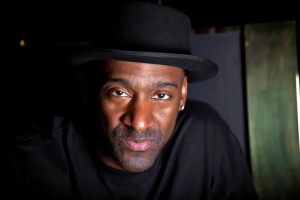
- “Japan has been a really beautiful place for a musician to play jazz. And so when I heard about the disaster, I said, man, I’d love to be able to give back a little bit.” (Andrew Dunn)
By JQ magazine’s Justin Tedaldi (CIR Kobe-shi, 2001-02) for Examiner.com. Visit his page here to subscribe for free alerts on newly published stories.
Born and bred in New York, Marcus Miller is a multi-instrumentalist, songwriter and producer who’s worked with everyone from Miles Davis to Luther Vandross to Frank Sinatra while waxing a score of records on his own. On May 15, the Grammy winner returns home to New York’s Highline Ballroom for a special one-night all-star benefit concert to provide financial relief and support to those devastated by the recent tsunami tragedy in Japan.
“Marcus Miller Presents: A Concert for Japanese Tsunami Relief” will feature performances by cutting edge artists from around the globe and across the musical spectrum, including African vocal superstar Angélique Kidjo, hip hop/jazz pioneer Q-Tip, trumpeter Wallace Roney (Miles’ heir apparent), drummer Ahmir “Questlove” Thompson (of the Roots), and taiko drummer/bamboo flautist Kaoru Watanabe, among others. In this exclusive interview, I spoke with Miller about the show, his three-decade history with Japan, and other high points of his career.
How did this benefit concert come together?
I heard about what was going on over there, and was trying to figure out—probably like a lot of people—what can I do? And I figured, you know what? I might be able to put together a benefit concert to try to raise some money, because at the time [of the earthquake] it seemed devastating, and as the weeks have gone by we actually realized it was much worse than we thought, with all this radiation and stuff. So you just want to do whatever you can to help, and show everyone that we’re thinking about them and trying to support them.
How did you choose the performers?
I just wanted to try to present something that was unique, you know what I mean? That kind of represented New York, because there’s a whole lot of different things going on in New York, and this is where I’m from. I thought it was a nice opportunity to bring a lot of different elements together.
Tell us about your history with Japan.
I first when to Japan when I was nineteen years old. I went with a saxophone player called Sadao Watanabe, who was the first Japanese musician to go to Berklee College of Music in Boston; one of the really early jazz musicians. And he’s really, really famous over there, you know, like a national icon. So it was a great introduction to Japan, because we went to every city in Japan—we went to the Japanese cities that Japanese people haven’t been to.
So I got a taste of the country and a taste of the culture, and I’ve been going back ever since. I’ve been there with the Brecker Brothers; I’ve been there with Miles Davis; I’ve been there with my own groups; with Herbie Hancock. And their appreciation of American jazz is just incredible—at first you can’t believe it, because they know every record that you’ve ever played on. I’ve had people waiting for me in hotel lobbies with a stack of a hundred LPs, and they want me to sign each one because I played on each one of them, you know? I sat there in the hotel, man, for an hour (laughs) signing LPs just because I admired their enthusiasm so much. So it’s been a really beautiful place for a musician to play jazz. And so when I heard about [the disaster], I said, man, I’d love to be able to give back a little bit.
What are some of your favorite memories of Japan?
My early memories—anybody who’s visited Japan probably has the same memory—first is the incredible jetlag. Staying up all night, and then wanting to go to sleep right before your concert, you know? If you ever saw Bill Murray in Lost in Translation, sitting on the edge of his bed in the middle of the night, everybody goes through that (laughs). But also, how generous their culture is; it’s very polite. Everyone is bowing to everyone, and when you get back to the States after you’ve been in Japan, you’ve got to remember to stop bowing, because then people think there’s something wrong with you, you know? The food is always a trip, interesting, and learning how to use chopsticks.
And the fact that they never really say “no” in Japan. Like if you walk into a store and say, “Do you have size ten shoes?” they shake their head yes and say, “Yes, I don’t think we have any,” you know what I mean? (Laughs) You begin using that. And like I was talking about, the enthusiasm for music is incredible there, and the beauty of the country—we go from city to city on the high-speed trains, so you get to really see in between the two cities; you get to see all these incredible fields and flowers and rice fields and workers in the traditional kind of Japanese clothes. It’s a really beautiful country. So those are the kinds of things that strike me about Japan.
You mentioned Sadao Watanabe before. Do you have any other favorite Japanese musicians?
There’s a guitarist named Kazumi Watanabe. I guess Watanabe’s a pretty common name, but Kazumi Watanabe’s a musician that I went to Japan with who’s also a great guitarist. I’ve played with a bunch of great Japanese American musicians—Teruo Nakamura was my first Japanese American musician who I played with and really learned a lot from; he’s a bass player. But they have some incredible Japanese musicians—I played with a Japanese koto player who plays the traditional instrument in a very contemporary style, very cool.
Read the complete interview here.
Justin’s Japan: New York’s Japan Society Ready to Rock with Hikashu, Tomoe Shinohara
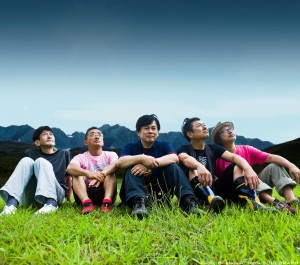
- Hikashu headlines New York’s Japan Society May 13 with Tomoe Shinohara and Steve Eto. (Ikeda Masaaki & Makigami Koichi)
By JQ magazine editor Justin Tedaldi (CIR Kobe-shi, 2001-02) for Examiner.com. Visit his page here to subscribe for free alerts on newly published stories.
This Friday (May 13), Japan Society’s Performing Arts Season goes into overdrive with Hikashu and Tomoe Shinohara Live in Concert, a special one-night-only event featuring the North American debut of legendary band Hikashu with special guests Tomoe Shinohara and Steve Eto.
Drawing on more than thirty years in the music business, Hikashu combines J-pop, new wave and electronic pop, taking listeners on unparalleled musical journeys through its signature sound. Led by its founder, enigmatic vocalist Makigami Koichi (vocal, theremin, cornet), the group’s members include Mita Freeman (guitar, sampler), Sakaide Masami (bass, electronics), Shimizu Kazuto (piano, synthesizer, bass-clarinet) and Sato Masaharu (drums, voice). Currently a lecturer at Shizuoka University of Art and Culture, Koichi has performed at Japan Society twice before as part of the New Voices from Japan series curated by John Zorn (2006) and Ikue Mori: Celebrating 30 Years of Live, Love & Music in NYC also curated by Zorn (2008).
Joining headliners Hikashu at the Manhattan venue is singer, actress and Japanese pop culture icon Tomoe Shinohara with percussionist Steve Eto. Best known to anime fans in the West for singing “Ultra Relax,” the title song of Kodomo no Omocha (released as Kodocha in North America), Shinohara is a choice stylistic counterpoint to the sounds on display. As a musician, songwriter and lyricist, Shinohara (or Shinorer, as her Japanese fans affectionately call her) has released a score of albums, featuring guest spots from artists as diverse as Pizzicato Five, Cibo Matto and Julio Iglesias(!).
For the rest of the story, click here.
Justin’s Japan: Interview with Author Arudou Debito on His Debut Novel “In Appropriate”
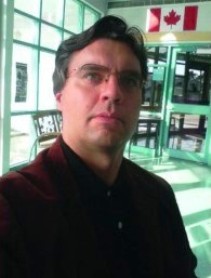
"I’m told Debito.org remains the resource for many JET Program participants looking for advice or needing an alternative perspective on Japan. See my speech to HAJET in 1999 on 'survival strategies in Japan,' which has apparently been reprinted in several JET publications." (Arudou Debito)
By JQ magazine’s Justin Tedaldi (CIR Kobe-shi, 2001-02) for Examiner.com. Visit his page here to subscribe for free alerts on newly published stories.
Divorce is tough, but divorce in Japan—especially if you’re a foreigner with kids—is a nightmare, explains Sapporo-based author Arudou Debito in his new book, In Appropriate: A Novel of Culture, Kidnapping, and Revenge in Modern Japan.
Originally raised in rural upstate New York as David Aldwinckle, Debito is a 23-year resident of Japan who obtained Japanese citizenship (and a name change) in 2000. As the Just Be Cause columnist at The Japan Times newspaper, his nonfiction books include Handbook for Newcomers, Migrants, and Immigrants, and Japanese Only: The Otaru Hot Springs Case and Racial Discrimination in Japan.
A longtime watchdog for foreigners’ rights in Japan, Debito’s first English-language novel takes a scalpel to the polite, friendly façade that tourists typically experience. In Appropriate examines the downright ugly aspects of Japanese life when a father is cut from all ties with his children post-divorce, which is not only common in Japan, but upheld by 19th century law. In this exclusive interview, Debito discusses his personal experiences that inspired the book, his history as an activist, and his thoughts on the future of Japan.
You’ve been known as an activist for over a decade and have published non-fiction works on the subject. What inspired you to write about child abduction in Japan, and what were your goals?
My goal with In Appropriate was to expose a dire social problem, as usual. But this time I thought fiction would be the better medium. Doing what I do, I hear a lot of stories about broken marriages in Japan, and having gone through a nasty divorce myself (seeing my children only about six times since 2003), I know a little bit about child abduction. What goes on in Japan beggars belief, but it’s hard to zero in on one non-fiction case and expect it to cover the scope of the problem.
Although international child abductions in other countries have gotten some press, the situation in Japan is much, much worse. Child abductions and parental alienation in Japan are, in a word, systematic—meaning they are hardly uncommon between Japanese, too (former prime minister Junichiro Koizumi is a famous example; he never saw one of his sons for nearly two decades). One parent after a divorce is generally expected to disappear, and have little to no contact with the children anymore. In Appropriate was meant as a primer to the issue.
Japanhas no system of joint custody or guaranteed visitation rights, and under this system I cannot recommend anyone, Japanese or non-Japanese (NJ), get married under it and consider having children. The risk is too great. We need fundamental reform of the Family Registry System and the laws governing divorce and child custody first.
Give us a basic overview on the phenomenon of kidnapping and left-behind parents in Japan.
It works like this: Japan’s divorce laws have been fundamentally unaltered since 1898(!), meaning modern-day common-sense divorces based upon “we just don’t like each other any more,” aka “irreconcilable differences,” don’t fly in Japan’s Family Courts. Fact is, if both sides don’t agree to a divorce, one side will have to portray the marriage as a living hell (even when it wasn’t) in public just to satisfy the requirements, inspiring vindictiveness in the other side. (Read more at www.debito.org/thedivorce.html.)
So after a successful split, one parent (usually the mother) gets the kids, and they are put on her Family Registry (koseki). Hers only, as Japan’s laws do not permit registry of people on two koseki. This means the other parent (usually the father) has no title or custody to the children (for example, I couldn’t even get an audience with my daughters’ junior high school teachers to see their grades). Access is granted only at the whim of the mother; I haven’t so much as seen a new photograph of my kids for about five years now. Even if the father goes to court to get a ruling guaranteeing visitation or access, if the mother again decides to make excuses for denial of visitation (or worse yet, levies a claim of “domestic violence”), the father will have to go to court again to get his rights enforced. Given that Japanese courts take months or years to hand down decisions, his kids will in the interim grow up alienated and never hearing his side.
This is what happens on a domestic level between Japanese. Now add the dimension of international marriage, where the NJ parent may have visa issues, face a language/culture barrier, or be communicating from overseas, and you have a more complex case. (More information via the Children’s Rights Network at www.crnjapan.net.)
Why did you choose the fiction novel format?
Because no single non-fiction case would capture the complicated dynamics of this issue properly. Besides, In Appropriate is about more than just divorce: I wanted to describe how a person would find a fascination in Japan and Japanese people, come over during Japan’s Bubble Era to see Japan ripe with opportunity, and find how Japan went sour as an economy over the past two decades. It was wonderful for me to recount this as a Bubble Era veteran—when in the late 1980s Japan looked poised to take over the world, was even challenging notions of how capitalism worked. Then see how, step-by-step, Japanese society would be squeezed and squeezed, convinced that recovery was right around the corner, just like Godot. How a person could become an immigrant to Japan—assimilating himself to the point of founding his own company, becoming bilingual in Japanese, even taking Japanese citizenship, yet be blindsided by events that were nearly always beyond his control. In Appropriate is much more than just a story of divorce—it’s a time capsule charting Japan’s descent into mediocrity and comparative international irrelevance. That’s best portrayed in a novel format.
What are some of your proudest moments at Debito.org since it went online, and why?
After a quiet start in 1997, Debito.org has been one damn issue after another. But in terms of sustainability, I gave a running commentary on the Otaru Onsens Case (www.debito.org/otarulawsuit.html) nearly weekly, sometimes daily, for four years; Debito.org as a source received enormous international media attention. Then Debito.org converted to a daily blog in 2006; I’ve done 2,000 more essays since (which means a total of probably about 5,000 archival materials by now).
I’m told Debito.org remains the resource for many JET Program participants looking for advice or needing an alternative perspective on Japan (see my speech to HAJET in 1999 on “survival strategies in Japan,” which has apparently been reprinted in several JET publications, at www.debito.org/HAJETspeech.html). Debito.org has been the launching pad for many a major media news story, in Japanese, English, and several other languages. It’s given a modicum of credibility to the oft-shaken belief that “the debate in Japan about internationalization and immigration” still exists unabated.
For the complete interview, click here.
Justin’s Japan: Interview with “Japanamerica” Author/JET Alum Roland Kelts on “Monkey Business”
By JQ magazine’s Justin Tedaldi (CIR Kobe-shi, 2001-02) for Examiner.com. Visit his page here to subscribe for free alerts on newly published stories.
Taking its name from the immortal Chuck Berry tune, the debut English-language edition of Monkey Business: New Voices from Japan is based on the annual Tokyo-based Japanese literary magazine founded in 2008 by award-winning translator, scholar, editor and author Motoyuki Shibata, one of Japan’s best known and most highly regarded translators of American fiction. The first installment offers poetry, Kafka-adapted manga, a wide-ranging, in-depth interview with Haruki Murakami, and much more. And despite its mischievous title, twenty-five percent of all Monkey Business sales will go toward the Nippon Foundation/CANPAN Northeastern Japan Earthquake and Tsunami Relief Fund.
Roland Kelts (Osaka-shi, 1998-99) is the author of 2006’s Japanamerica: How Japanese Pop Culture Has Invaded the U.S. and a curator and editor for Monkey Business. A weekly columnist for The Daily Yomiuri, commentator for National Public Radio, and teacher of Japanese popular culture at New York University and the University of Tokyo (he splits his time between both cities), Kelts is back in town this week for the new book’s launch, beginning April 30 at Asia Society, May 1 at BookCourt in Brooklyn, and May 3 at Japan Society. I caught up with Kelts during his recent appearance at Seattle’s Sakura-Con for this exclusive interview.
How did you get involved as an editor and curator for this book?
My dear friend, Motoyuki Shibata, Japan’s premier translator of American literature, talked to me two years ago about publishing an English-language version of Monkey Business, his literary magazine. As an editor at A Public Space, a literary magazine based in Brooklyn, I was keen to build another bridge between the two countries. I talked at length with Brigid Hughes, the founding editor of A Public Space, and she was interested. Then we received a grant from the Nippon Foundation, and the Japan Foundation, the Asia Society and the Japan Society all supported our project. I am deeply grateful to all parties involved.
What can readers expect from the book?
The freshest, newest, most exciting contemporary literature, poetry and manga from Japan, plus some American voices, like Barry Yourgrau, who have emerged as major American authors in Japan.
How did you select the pieces to be selected for the English version?
Motoyuki Shibata, Ted Goosen and major translators like Jay Rubin (Haruki Murakami’s translator) and Michael Emmerich all created the final manuscript. Shibata and Goosen then sent it to me and Brigid Hughes, and we had several conversations in order to select the best material for an American readership.
What are the biggest challenges of translating and editing Japanese creative writing into English?
It’s not as simple as it sounds. You need to choose the material that will speak to American readers, who, after all, are limited and defined by their cultural context. Not every successful book in Japan will speak to American readers. You need cultural authorities on both sides of the Pacific Ocean to make a valuable publication.
You’ve been working on a novel of your own called Access for years now. What can you tell us about it, and how’s it coming along?
Very close to completion. I think it’s a masterpiece, but I’m partial, of course. It’s a cross-cultural narrative built upon sex and longing—both close to my heart.
As a participant of Japan’s international exchange-based JET Program, what were your biggest takeaways from your experience that you’ve applied to your career today?
I learned how to live and work in Japan—an invaluable lesson.
Read the rest of the interview here.
Justin’s Japan: This week’s Nippon in NY events: NY Loves Japan, Japan-a-Mania, Sakura Matsuri
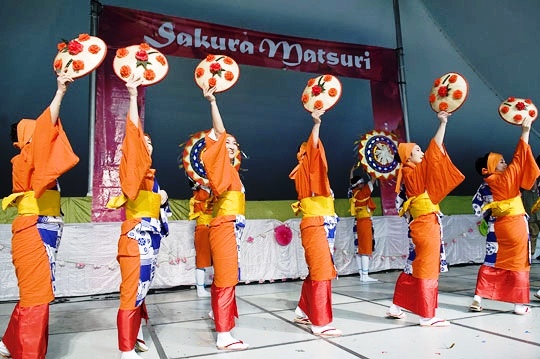
The Japanese Folk Dance Institute of New York joins a superb lineup of peformers at the Sakura Matsuri festival at Brooklyn Botanic Garden this weekend, April 30-May 1. (Jason Gardner)
By JQ magazine editor Justin Tedaldi (CIR Kobe-shi, 2001-02) for Examiner.com. Visit his page here to subscribe for free alerts on newly published stories.
After all those April showers, it’s finally starting to feel like spring. And what better way to welcome those May flowers than with these events, capped off with the 30th(!) annual edition of a Brooklyn Botanic Garden classic.
Wednesday, April 27, 2011, 7:00 p.m.-10:00 p.m.
269 11th Avenue (between 27th and 28th Streets)
Tickets: $100 general admission/$175 VIP (click here for VIP details)
The New York Sake and Japanese Food Community has joined together with non-profit volunteer organization Project by Project to organize a fundraising event to support disaster relief in Japan in the wake of the Tohoku earthquake and tsunami. New York’s leading Japanese food and sake distributors, chefs, restaurants (including Bao Noodles, owned by JET alum Chris Johnson (Oita-ken, 1992-95), who also helped organized the event), food writers, public relations companies, and cooking schools have come together to form NY Loves Japan. Help spread the word through their Twitter and Facebook pages as well.
Saturday, April 30, 12:30 p.m.-4:30 p.m.
Japan-a-Mania
Big Brothers Big Sisters of New York City
223 E 30th Street (between 2nd and 3rd Avenues)
Free to volunteer. RSVP to Katrina Barnas
Back by popular demand! Join fellow members of the JET Program Alumni Association of New York as they teach NYC kids about Japanese culture in partnership with Big Brothers Big Sisters and NY de Volunteer. Step up to show off your origami, katakana or kimono-tying skills, or help with crowd control and meet new friends. Last year’s event drew over 60 kids with their bigs, and even more are expected this year. Also welcome are planners and anyone who can provide contacts for or perhaps lead a karate demonstration.
Saturday, April 30-May 1, 11:00 a.m.-6:00 p.m.
Enter at 900 Washington Avenue (between Crown and Carroll Streets)
Tickets: $10/$15 general admission; free for children under 12 and BBG members
During this season celebrating its historic relationship to Japanese culture and horticulture, the Garden reflects on the recent tragic events in Japan, and invites visitors to find opportunities for contemplation amidst its flowering cherries, Japanese Hill-and-Pond Garden, the bonsai exhibition Graceful Perseverance, and more. Visitors will be invited to make an origami crane that will eventually join thousands of others sent to Japan as a gesture of support and unity.
Click here to learn more about the events.
Justin’s Japan: Tribeca Film Festival Q&A with director David Gelb on ‘Jiro Dreams of Sushi’
By JQ magazine editor Justin Tedaldi (CIR Kobe-shi, 2001-02) for Examiner.com. Visit his page here to subscribe for free alerts on newly published stories.
An indubitably delicious documentary, Jiro Dreams of Sushi follows 85-year-old master sushi chef Jiro Ono, owner of the esteemed ten-seat Sukiyabashi Jiro restaurant in Tokyo. From the ins and outs of the tuna auction to the proper way to massage an octopus, the film is a lushly photographed homage to the artisan sushi techniques that earned Jiro an elite three Michelin stars, one of just twenty-six restaurants in all of Japan to receive the honor last year.
This mouthwatering movie makes its New York bow Thursday (April 21) as part of the Tribeca Film Festival. In this exclusive interview, I caught up with director David Gelb to discuss his cinematic celebration of the art of sushi, along with its themes of family, tradition, and the value of hard work.
Tell us about your relationship and history with Japan.
When I was very young my parents took me to Japan on business trips. Even though I was only nine years old the third time I went, I already felt a tangible familiarity and affection to the food and the culture. The toys were definitely cooler. I was as fascinated by a history populated by samurai and warlords as much as the fiction with the giant robots and all that.
What else do you enjoy most about Japanese culture?
My favorite thing about the Japanese culture is the philosophy of specialization and mastery. There is a lot of value and respect for people that devote their lives to a single craft. You don’t see this as much in some Western countries.For example, in the USA, many local butchers have been driven out of business by supermarkets. Because of this, the sons of butchers are looking for other jobs to survive, and the skills they and their fathers have developed will be lost. In Japan, however, you’ll see more businesses dedicated to excellence before profits. Being a master butcher is a highly respected and potentially lucrative enterprise. Even in Japan, however, the consolidation of big business and globalization is a threat to craftsmen in small shops. According to many Japanese craftsmen that I interviewed, it has become harder to find young people that have the patience to learn a skill fully. In Japan, it takes years to become a master butcher.
What were your goals with this film? Did it turn out the way you originally anticipated, or did anything about it change during the production period?
Originally, this was going to be a much more general film that would feature many sushi chefs all over the world. In my mind it was the [celebrated BBC documentary] Planet Earth of sushi. I shot some short test segments, but then changed course and decided on a more human approach, making it just about Jiro and his family. Everything I wanted to convey about sushi was right here at Jiro’s restaurant.
How much time in all did you spend filming? Was it difficult to shoot in Japan and work around scheduling repeat visits to Tokyo?
I shot for the month of February in 2010, then returned to L.A. to work with my editor, Brandon Driscoll-Luttringer. After we spent a few months translating and reviewing the footage, we figured out what the story was about, and I returned to Japan to finish. I had some fantastic help on the ground in Tokyo—my translators Yukako Inoue and Shino Nakamura—to organize everything. Without them, it would have been extremely difficult.
What were Jiro and his family’s ground rules for making the film? Was there anything that you were forbidden from shooting?
The only rule was not to film the duo of incredibly hardworking and meticulous ladies that are in charge of cleaning and the cash register. It is a shame because one of the amazing things about Sukiyabashi Jiro is that it is probably the cleanest and most organized restaurant in the world. Literally not a spec of dust goes unchecked in the entire restaurant. The bottoms of the tables are just as clean as the tops. Women of that generation are particularly shy of cameras, and I was very careful to respect their wishes not to be filmed.
Read the rest of the interview here.
Justin’s Japan: Deep Purple Guitarist Steve Morse Weighs in on the Japan Catastrophe
By JQ magazine editor Justin Tedaldi (CIR Kobe-shi, 2001-02) for Examiner.com. Visit his page here to subscribe for free alerts on newly published stories.
Throughout its career, Deep Purple–who formed in England in 1968 and released their debut album that year–has sold over 100 million albums worldwide. Revered in Japan, their iconic rock hits include “Smoke on the Water,” “Highway Star,” and “Woman from Tokyo.” After a four-year hiatus from American shores, the band’s upcoming tour, called Deep Purple: The Songs That Built Rock, finds them returning with a symphony orchestra.
In this exclusive interview, I spoke with Steve Morse, the group’s guitarist since 1994, about the tour, and his thoughts on the cataclysmic events happening in Japan.
Regarding the recent catastrophe in Japan, is the band planning to do any special shows or benefits at this point?
No, we haven’t gotten anything that we’re privy to at the moment. I think the thing in Japan is, they sort of differ from a Third World country that just totally doesn’t know what to do. The people of Japan are so incredibly organized and capable, I don’t know how anybody can help them that isn’t right there. They need all kinds of support. The logistics of getting what they need to them is obviously the problem—it’s not being able to afford it, as far as what I’ve seen. And don’t forget that at this time I’ve got a limited view, because I’m working all the time [Morse was touring with the band in Eastern Europe during this interview], and I can’t just turn on the TV and get anything set to a certain very narrow international news station.
So from my point of view, it looks like they need more logistical support than moral support to raise more money for food or anything. I could be wrong, but it looks like they’ve got that part covered, and the government is willing to do whatever it takes to get the people back on their feet and working again. But they’re handling some really amazing problems right now, and one last thing that I get from that is how incredibly dignified they are in such a time of stress.
Of course Deep Purple has a long relationship with Japan and its people, making live albums recorded there something special long before bands like Cheap Trick came along. What’s it like when you go over there as a member of the group?
Deep Purple has very old acquaintances, like promoter Mr. Udo, and everybody knows people there, so it’s a friendly, familiar place. And like I said, it’s so organized and dignified, it’s just wonderful. It’s wonderful to see a guy driving a cab that’s spotless, with white gloves on, and that’s any cab you get into.
The trains, they come exactly on time, they leave exactly on time, and they go really fast. So a lot of times we just ride the trains, because it’s the best way to go. And when you’ve got mass transit that’s that organized, even in an earthquake zone, it’s still the way to go. It beats traffic, you know? And whenever we get mass transit that’s that organized and that cool and that fast and that reliable, I think then America could really cut down on one person per Suburban, you know? (Laughs.)
Is there any place that you haven’t played yet that you’re looking forward to?
Oh, yeah. I’d like to see—and this is not a joke—Antarctica. Because I’m fascinated with technology and how people cope with things. Since I’m a member of Deep Purple, and have played outside in the snow on top of a mountain, in a desert (laughs) and in a monsoon in Korea, I think, outside, getting drenched, it seems like if we can play anywhere, we might as well go to the most extreme gig possible, and that would be Antarctica. Maybe even the North Pole, I don’t know. But there’s some parts of Africa that we haven’t been to, and that would be interesting, especially if they were able to accommodate all the power and logistics for the band. The adventure never stops.
Read the rest of the interview here.
Justin’s Japan: New York’s Blue Note Benefit for Japan concerts to stage two-night support stand
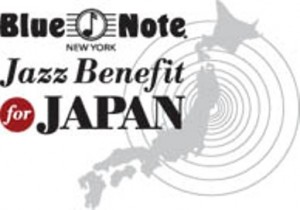
- The Blue Note Jazz Benefit for Japan concerts will be held at New York’s Highline Ballroom April 18-19. (Blue Note New York)
By JQ magazine’s Justin Tedaldi (CIR Kobe-shi, 2001-02) for Examiner.com. Visit his page here to subscribe for free alerts on newly published stories.
Japan has always been there for jazz. Now, jazz is giving back.
The Blue Note New York will host a harmonious benefit at Manhattan’s Highline Ballroom for two consecutive nights beginning Monday (April 18), with all of the ticket proceeds to be donated to the Japan Relief and Recovery Fund spearheaded by Direct Relief.
The event is being organized by talent buyer Seiko Kinoshita, who has worked at Blue Note New York since 1996. “As the details of the disaster unfolded, I felt sad and frustrated that I couldn’t do much to help, being so far away from my home country,” said the Fukuoka native. “Having worked in the jazz industry for most of my adult life, I decided to organize a benefit concert and was very encouraged by the willingness of the artists, as well as their agents and managers, to support the event. I believe that every little bit helps, and I want the Japanese people to know that New Yorkers and the jazz community care deeply about them and their country and want to do what they can to help.”
For the last 23 years, Blue Note has maintained clubs in multiple Japanese cities, with current establishments in Tokyo and Nagoya. Ron Carter, the distinguished jazz bassist who will be among the all-star musicians at Highline on April 19, wrote of his concerns and appreciation for the Japanese people: “We share the grief of the enormous loss of life and displacement of the Japanese people. I will pray for Japan’s fast recovery and will do everything in my power to help. The Japanese jazz fan is the most important supporter of my music, and I am always grateful for the years Japan has stood by my side.”
Click here for the complete story.
Justin’s Japan: One month after the Tohoku Earthquake, New York offers more Japan benefit events
By JQ magazine’s Justin Tedaldi (CIR Kobe-shi, 2001-02) for Examiner.com. Visit his page here to subscribe for free alerts on newly published stories.
The massive aftershocks reported in Japan earlier today symbolized the island nation’s continued appreciation of support from around the world one month after the Tohoku Earthquake. Here are some of this week’s benefit and lecture events in New York.
Monday, April 11, 2:00 p.m.-9:00 p.m.
Japan Earthquake and Nuclear Crisis Relief Exhibition
Featuring artist talk “Dialogue with Mariko Mori and Ingo Günther” moderated by Reiko Tomii and live performances
Gallery 61, New York Institute of Technology, 16 West 61st Street. 11th floor
Donations welcome
Just one month ago, the 2011 Tohoku earthquake and tsunami and aftermath rocked the nation of Japan. The death toll is still climbing, with over 10,000 people who lost their lives, and almost 20,000 people reported missing. Over 300,000 people lost their homes and are now living without adequate food and water. Millions of people are living with anxiety and fear of being exposed to the dangers of raising radioactive levels. And their struggles are far from over.
We Are One features artwork donated by Japanese artists living in New York to support the people in Japan. Their mission is to raise money to help with the relief efforts of the Japan earthquake and nuclear crisis, spread awareness of what has happened, and what we can do among the international community. On display are donations from approximately 100 professional Japanese artists living in New York in painting, drawing, mixed media, prints, and photography. All donated artwork will be sold at a reasonable price of $100-$200. All proceeds will go to Japan Society’s “Japan Earthquake Relief Fund.”
Tuesday, April 12, 7:00 p.m.-9:00 p.m.
iNFiNiTY cooperation cross-cultural mass choir performance
Lt. Joseph P. Kennedy Center, Lower Auditorium
34 West 134th Street(Between Lenox and Fifth Avenues)
Donations welcome
“Don’t Give Up” is a song written by the American gospel composer Danny Eason. It was recorded by Eason in Japan in 2010 with Japanese blind artist Kohshi with the Japanese choir Gospel Now Japan. For this special charity rehearsal event managed by NY Hallelujah Company LLC, you can join the choir for Japan and sing with the group, raising your voice for Japan and encouraging its people. All voices and all musicians are welcome, prior to an upcoming performance in May with Eason.
According to the Japanese Red Cross, over $223,000,000 in donations were received in just one week from Japan’s friends overseas and from corporations. Over 20,000 people have been rescued by the Japanese Ministry of Defense and they are trying to save even more lives. Over 10,000 lives have been lost, but the number of victims will continue to rise with an additional 18,000 people unaccounted for, and 240,000 people have been forced to leave their homes to stay in temporary shelters. To participate, contact project leader Ms. Kyoko Uchiki at NYHCLLC[at]gmail.com or (212) 996-4302. For additional information, visit www.myspace.com/dont-give-up.
Tuesday, April 12, 8:00 p.m.-12:00 a.m.
Featuring The Orion Experience
Brooklyn Bowl
61 Wythe Ave.(between N 11th & N 12th Streets)
$10 suggested donation, 18+ only.
The critics are raving about The Orion Experience’s upcoming EP NYC Girl. USA Today says it “recalls ’70s-era Electric Light Orchestra,” while Time Out New York exclaims “The Orion Experience…impresses with its buoyant, hooky tunes, making awesome use of a coed tag-team vocal approach on a new EP.” The band also recently released their song “Nippon Ga Dai Suki (Japan We Love You)” for the first time in the U.S., with all proceeds from purchases via CDBaby and iTunes going to The Jewish Federations of North America’s Japan Relief Fund.
For a complete listing, click here.
Justin’s Japan: In New York This Week, JET Fundraisers, Networkings, Sake, Arts, Monster Wrestling
By JQ magazine’s Justin Tedaldi (CIR Kobe-shi, 2001-02) for Examiner.com. Visit his page here to subscribe for free alerts on newly published stories.
Only in New York. As the JapanNYC festival’s slated performances wrap up this week, here’s a rundown of more Nippon-flavored events of note:
Tuesday, April 5, 6:30 p.m.-9:30 p.m.
Slate – 54 West 21st Street (between 5th and 6th Avenues)
$25 donation for entry, plus two raffle tickets. Additional tickets can be purchased both in advance and during the event.
The JET Alumni Association of New York, in partnership with NY de Volunteer, will be holding a fundraiser to benefit Japan. The night will include great drink specials, entertainment, and wonderful raffle prizes. Over 30 generous JET Alumni and local businesses have donated goods and services to the cause, such as cooking classes, bottles of sake, private dance lessons, handmade jewelry, and more!
All proceeds from this event will go to the JETAA USA Japan Earthquake Relief Fund. During the event, volunteers will be collecting messages for Send Hope to Japan from the World to further express solidarity during this difficult time. This open event will have a great crowd of JET alumni, members of the local Japanese community, and many other New Yorkers wanting to show their support. All are welcome to attend.
Tuesday, April 5, 7:00 p.m.-10:00 p.m.
Solas – 232 East 9th Street (between 2nd and 3rd Avenues)
Free with RSVP to events@hillslearning.com. $5 suggested donation at door.
Spring is here, and what better way to bring in the new season than to celebrate and network! Hills Learning and Two Rivers Associates will provide a raffle, snacks, and, of course, multiple opportunities to build your network. Come enjoy the fresh smells and sights of spring and build up your contacts in the season of new opportunities. The Solas bar will of course provide an extended happy hour for guests, and an exclusive second floor private bar service.
Saturday, April 9, 11:00 a.m.-11:00 p.m.
Concert for Japan
Japan Society
333 E. 47th Street (between 1st and 2nd Avenues)
Tickets: $5/$100 for gala block for certain acts
Japan Society‘s is raising the roof (and funds to help Japan) with this ambitious 12-hour concert extravaganza, from which 100% of the proceeds will go to the Japan Society’s Japan Earthquake Relief Fund. John Zorn organized the GALA BLOCKS, which include Philip Glass and Hal Willner, Lou Reed, Laurie Anderson, Ryuichi Sakamoto, and Bill Laswell with gigi band. New York-based Japanese bands Echostream, Hard Nips, and Me and Mars will also perform. Shakuhachi Grand Master James Nyoraku Schlefer assembled a group of traditional Japanese artists such as koto player Masayo Ishigure and gagaku flute player Sadahiro Kakitani. In addition to these musical delights, there will be special activities, from learning basic Japanese phrases to origami crane folding to learning the basics of shodo calligraphy.
Saturday, April 9, 7:00 p.m.
Kaiju Big Battel – “When Danger Comes to Town”
B.B. King Blues Club & Grill
237 West 42nd Street (between 7th and 8th Avenues)
Tickets: $15.00 advance general admission/$18.00 day of show
In perhaps the ultimate American nod to Godzilla and Ultraman-styled smackdowns, Kaiju Big Battel is live wrestling of epic proportions. Planet Earth is under threat: scattered throughout the galaxy is a monstrous mob of maniacal villains, menacing alien beasts, and giant, city-crushing monsters that are waging war against one another. Currently, the Kaiju Universe maintains an active roster of approximately 30 monsters, including a blue alien-glutton named Sky Deviler, a factory-worker-turned-soup-can called Kung-Fu Chicken Noodle, and a despicable, square-headed mad scientist known as Dr. Cube. After a rapturous reception at Brooklyn’s Warsaw last October, Kaiju is taking Manhattan with no holds barred.
Click here for the rest of this week’s events.

